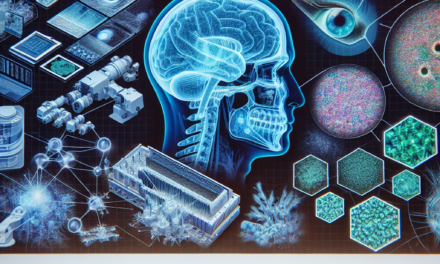Shift Your Perspective: Embrace Clarity Instead of Denials
In a world filled with complexities and uncertainties, the ability to shift our perspective can be a powerful tool for personal growth and emotional well-being. Embracing clarity instead of denial allows us to confront challenges head-on, fostering resilience and adaptability. This article explores the importance of perspective, the dangers of denial, and practical strategies for cultivating clarity in various aspects of life.
The Nature of Perspective
Perspective is the lens through which we view the world. It shapes our thoughts, feelings, and actions, influencing how we respond to situations. Understanding the nature of perspective is crucial for personal development and emotional intelligence.
Understanding Perspective
Perspective is not merely a point of view; it encompasses our beliefs, experiences, and values. It is shaped by various factors, including:
- Culture: Our cultural background influences how we interpret events and interact with others.
- Personal Experiences: Past experiences shape our expectations and reactions to new situations.
- Emotional State: Our current emotional state can cloud or clarify our perspective.
- Social Influences: The opinions and beliefs of those around us can impact our perspective.
Recognizing these influences is the first step in shifting our perspective. By understanding how our viewpoint is formed, we can begin to challenge and change it when necessary.
The Role of Clarity in Perspective
Clarity is the ability to see things as they are, free from distortion or confusion. It allows us to make informed decisions and take appropriate actions. When we embrace clarity, we can:
- Identify Problems: Clarity helps us recognize issues before they escalate.
- Make Informed Decisions: With a clear perspective, we can weigh options and consequences effectively.
- Enhance Communication: Clarity fosters better understanding in our interactions with others.
- Build Resilience: A clear perspective enables us to adapt to challenges and setbacks.
In contrast, denial can cloud our judgment and prevent us from seeing the truth. It can manifest in various forms, such as refusing to acknowledge a problem or minimizing its significance. Understanding the difference between clarity and denial is essential for personal growth.
The Dangers of Denial
Denial is a defense mechanism that can provide temporary relief from uncomfortable truths. However, it often leads to more significant problems in the long run. Recognizing the dangers of denial is crucial for fostering a mindset of clarity.
Types of Denial
Denial can take many forms, including:
- Simple Denial: Refusing to accept the reality of a situation.
- Minimization: Downplaying the significance of an issue.
- Projection: Attributing one’s own feelings or thoughts to others.
- Rationalization: Justifying behaviors or decisions to avoid facing the truth.
Each type of denial can hinder personal growth and lead to negative consequences. For example, someone who minimizes their health issues may neglect necessary medical care, resulting in more severe health problems.
The Psychological Impact of Denial
Denial can have profound psychological effects, including:
- Increased Anxiety: Avoiding reality can lead to heightened anxiety as unresolved issues linger.
- Depression: Denial can contribute to feelings of hopelessness and despair.
- Relationship Strain: Denial can create misunderstandings and conflicts in relationships.
- Stunted Growth: Avoiding challenges prevents personal development and learning.
Research has shown that individuals who engage in denial are more likely to experience mental health issues. A study published in the journal *Psychological Science* found that denial can lead to increased stress and decreased overall well-being.
Case Study: The Impact of Denial in Addiction
Denial is a common barrier in addiction recovery. Many individuals struggling with substance abuse refuse to acknowledge the severity of their addiction. This denial can prevent them from seeking help and ultimately prolong their suffering.
For instance, a study conducted by the National Institute on Drug Abuse found that approximately 40% of individuals with substance use disorders deny having a problem. This denial not only affects their health but also impacts their relationships and employment.
In contrast, those who embrace clarity and acknowledge their addiction are more likely to seek treatment and achieve long-term recovery. Programs that emphasize self-awareness and acceptance, such as Alcoholics Anonymous, have proven effective in helping individuals confront their denial and embrace clarity.
Strategies for Embracing Clarity
Shifting from denial to clarity requires intentional effort and practice. Here are several strategies to help individuals embrace clarity in their lives.
1. Self-Reflection
Self-reflection is a powerful tool for gaining clarity. By taking time to examine our thoughts and feelings, we can identify areas of denial and work towards acceptance. Here are some self-reflection techniques:
- Journaling: Writing down thoughts and feelings can help clarify emotions and identify patterns.
- Meditation: Mindfulness meditation encourages present-moment awareness, fostering clarity.
- Seeking Feedback: Asking trusted friends or family for their perspectives can provide valuable insights.
Regular self-reflection can lead to greater self-awareness and a clearer understanding of our challenges and goals.
2. Setting Realistic Goals
Setting realistic goals is essential for embracing clarity. When we set achievable goals, we create a roadmap for success. Here are some tips for effective goal-setting:
- Be Specific: Clearly define what you want to achieve.
- Make it Measurable: Establish criteria for measuring progress.
- Set a Timeline: Create a timeline for achieving your goals.
- Stay Flexible: Be open to adjusting your goals as needed.
By setting realistic goals, we can focus our energy on what truly matters, reducing the likelihood of denial and fostering clarity.
3. Cultivating Emotional Intelligence
Emotional intelligence (EI) is the ability to recognize and manage our emotions and the emotions of others. Cultivating EI can enhance our clarity and decision-making abilities. Here are some ways to develop emotional intelligence:
- Practice Empathy: Try to understand others’ perspectives and feelings.
- Manage Stress: Develop healthy coping mechanisms for stress and anxiety.
- Improve Communication: Practice active listening and clear expression of thoughts and feelings.
Research has shown that individuals with high emotional intelligence are better equipped to handle challenges and make informed decisions. A study published in the *Journal of Organizational Behavior* found that emotional intelligence is positively correlated with job performance and leadership effectiveness.
4. Seeking Professional Help
Sometimes, embracing clarity requires external support. Seeking professional help from a therapist or counselor can provide valuable insights and guidance. Here are some benefits of professional support:
- Objective Perspective: A therapist can offer an unbiased viewpoint on your situation.
- Tools and Techniques: Professionals can provide strategies for coping with denial and fostering clarity.
- Accountability: Regular sessions can help keep you accountable for your progress.
Many individuals find that therapy helps them confront their denial and gain clarity on their challenges. A study published in *Psychotherapy Research* found that therapy significantly reduces denial and improves overall mental health.
5. Building a Supportive Network
A supportive network of friends, family, and peers can play a crucial role in fostering clarity. Surrounding ourselves with positive influences encourages open communication and accountability. Here are some ways to build a supportive network:
- Join Support Groups: Participate in groups that focus on personal growth and accountability.
- Engage in Community Activities: Get involved in community events to meet like-minded individuals.
- Communicate Openly: Foster open and honest communication with friends and family.
Research has shown that social support is linked to improved mental health outcomes. A study published in the *American Journal of Psychiatry* found that individuals with strong social support networks are less likely to experience depression and anxiety.
Real-Life Examples of Shifting Perspective
Shifting perspective from denial to clarity can lead to transformative changes in individuals’ lives. Here are some real-life examples that illustrate the power of embracing clarity.
Case Study: Overcoming Health Challenges
Consider the story of Sarah, a 35-year-old woman who struggled with obesity for years. Initially, Sarah denied the severity of her condition, often rationalizing her unhealthy eating habits. However, after experiencing health complications, she decided to confront her reality.
Through self-reflection and professional support, Sarah began to embrace clarity. She set realistic health goals, sought guidance from a nutritionist, and joined a local fitness group. Over time, Sarah lost weight, improved her health, and gained confidence. Her journey exemplifies how embracing clarity can lead to positive change.
Case Study: Navigating Career Transitions
John, a mid-level manager, faced a career crossroads when his company underwent restructuring. Initially, he denied the possibility of losing his job, clinging to the hope that things would return to normal. However, as the situation progressed, he realized he needed to confront the reality of his circumstances.
By seeking feedback from colleagues and engaging in self-reflection, John gained clarity about his career goals. He updated his resume, networked with industry professionals, and ultimately secured a new position that aligned with his aspirations. John’s story highlights the importance of embracing clarity in navigating career transitions.
Case Study: Improving Relationships
Emily and Mark had been in a long-term relationship, but they often found themselves in conflict. Emily frequently denied the issues in their relationship, believing that love alone could solve their problems. However, after attending couples therapy, she began to embrace clarity.
Through open communication and self-reflection, Emily recognized her role in the relationship dynamics. She learned to express her feelings honestly and actively listen to Mark’s concerns. As a result, their relationship improved significantly, demonstrating how clarity can enhance interpersonal connections.
Conclusion
Shifting our perspective from denial to clarity is a transformative journey that requires intentional effort and practice. By understanding the nature of perspective, recognizing the dangers of denial, and implementing strategies for embracing clarity, we can foster personal growth and emotional well-being.
Key takeaways from this article include:
- Perspective shapes our thoughts and actions; understanding its nature is crucial for personal development.
- Denial can hinder growth and lead to negative consequences; recognizing its forms is essential.
- Embracing clarity involves self-reflection, setting realistic goals, cultivating emotional intelligence, seeking professional help, and building a supportive network.
- Real-life examples demonstrate the transformative power of shifting perspective from denial to clarity.
Ultimately, embracing clarity allows us to confront challenges head-on, fostering resilience and adaptability in an ever-changing world. By shifting our perspective, we can unlock our potential and lead more fulfilling lives.




